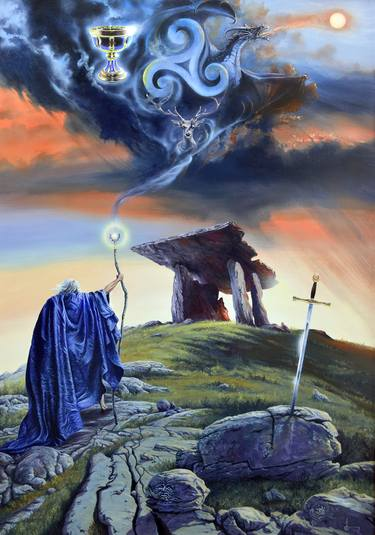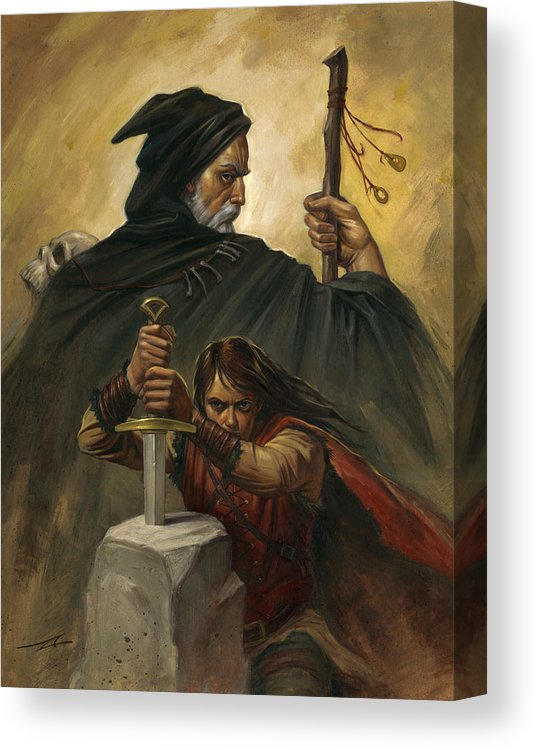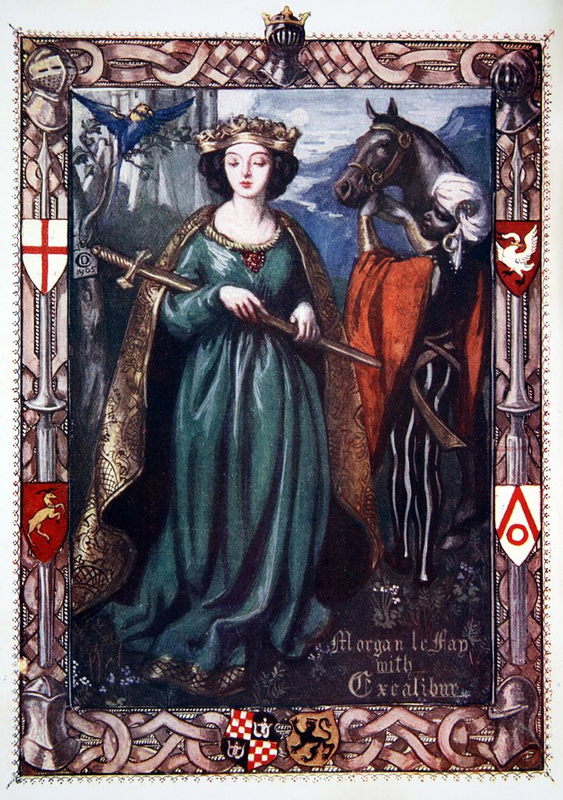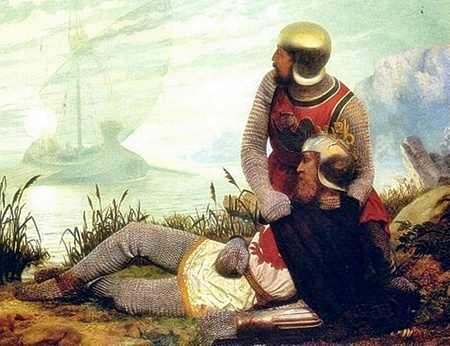Lesson 5) Merlin and King Arthur
Good morning, students! Today, I have invited a guest lecturer for today’s lesson on Merlin and King Arthur. Most of you would know her, as she is Ms. Astarael Hunt, the former Ancient Studies professor and an expert on this topic. Even though she has left Hogwarts, I’ve managed to catch her while she’s back for a short visit to teach you about a topic she is very passionate about and interested in.
Before giving the floor to Ms. Hunt, I would like to remind all students to not get too swept away in Ms. Hunt’s engaging lesson. Don’t forget that you have your midterm after class! The test will include topics from all lessons so far this year, including this one. Please revise your notes before attempting the assessment and I’m sure you will be able to pass with flying colors.
Without further ado, let’s put our hands together for Ms. Hunt!
Arthurian Times and Camelot
Good day, everyone! Your professor has very kindly allowed me to guest lecture on this lesson, as she knows the legend -- or rather, the history -- of Merlin and King Arthur is something I have spent a large portion of my life studying. In class today we shall begin our journey into Arthurian times. As many of you might have read, the legend of King Arthur is often considered just that, a legend, by Muggles. However, Merlin, King Arthur, Morgana le Fay, and many more were very much real and are important parts of our history. There are many myths and stories surrounding them, and because these events happened so long ago, it can be quite difficult to separate the truth from exaggeration or misunderstandings. This is something I’m sure your Ancient Studies and Mythology professors will emphasize to you when, and if, you take their classes. The situation is further complicated by the fact that we don’t always know whether stories have been authored by witches and wizards with a good understanding of magic, or if they were recorded by Muggles who had a limited understanding of what they saw.
Still, with all these limitations, magihistorians have been able to search out the truth (or the closest we’re likely to get that many scholars can generally agree upon) with just a little help from additional documents that have been kept safely from Muggle hands. However, there is still a wealth of misinformation floating around on this subject. We’ll be taking this lesson to clear up some of the misconceptions you might have had and learn about some truly fascinating (and quite powerful) witches and wizards, as well as briefly note who was lacking in magical ability.
Merlin
Known as one of the greatest wizards of all time, Merlin was advisor to King Arthur and his father, King Uther Pendragon. There are many different stories regarding Merlin’s birth, with one account stating that he was the offspring of a demon and a virgin, and it was his demonic heritage that gave him his prophetic powers. However, the simple truth was that Merlin was a powerful half-blood wizard, born to a witch and a Muggle. He later attended Hogwarts School of Witchcraft and Wizardry, where he was subsequently sorted into Slytherin, most likely due to his cunning nature. He possessed a brilliant mind that allowed him to excel in every aspect of his magical education, far ahead of his peers and sought to achieve much with that knowledge.
 Not much is known about Merlin’s years prior to becoming an advisor to Arthur. It is not known where he went after graduating from Hogwarts, though it has often been presumed that he entered the service of Uther Pendragon as his trusted advisor first. One of the most popular accounts of how he obtained this position tells of Merlin relating a prophecy to the King. In some accounts, this prophecy was told to him by a dragon, and detailed how Uther would bear a son who would one day unite his warring kingdom and become the greatest king of all. Due to a lack of records, and perhaps due to negligence or the destruction of any personal documents, this account cannot be verified. And, as you know, communication with dragons in this manner is certainly not possible at the moment, and very well might never have been. Most wizards favour the account in which Merlin simply glimpsed the future with his exceptional skills in divination, as he was known to be a great seer.
Not much is known about Merlin’s years prior to becoming an advisor to Arthur. It is not known where he went after graduating from Hogwarts, though it has often been presumed that he entered the service of Uther Pendragon as his trusted advisor first. One of the most popular accounts of how he obtained this position tells of Merlin relating a prophecy to the King. In some accounts, this prophecy was told to him by a dragon, and detailed how Uther would bear a son who would one day unite his warring kingdom and become the greatest king of all. Due to a lack of records, and perhaps due to negligence or the destruction of any personal documents, this account cannot be verified. And, as you know, communication with dragons in this manner is certainly not possible at the moment, and very well might never have been. Most wizards favour the account in which Merlin simply glimpsed the future with his exceptional skills in divination, as he was known to be a great seer.
Now, what has been agreed upon, by both Muggle and magical historians, is that Merlin aided in the conception of Arthur. Uther desired the wife of his ally Gorlois, a beautiful woman named Igraine. He sought the help of Merlin (who provided him with a potion that was an early version of what is now known as Polyjuice) in order to take on the appearance of Gorlois and bed Igraine. Arthur was conceived from this union, and Uther died shortly afterward, but not before ordering Merlin to hide his son and heir from the warring kings who might wish the baby harm. He did so, and Arthur grew up to be a healthy young man, but we will leave those details until we come to Arthur’s story.
However, for all the protection Merlin offered his young charge, nor for all his shrewdness and gift of prophecy, he could not foresee his own downfall. Thus he was vulnerable to the seduction and sway of Vivien, a young witch who was a student of Morgana. Luring Merlin with pretty words of praise and love -- and no small bit of magic -- she trapped him within an enchanted cave. Although Merlin was said to have escaped, his magic was greatly reduced and weakened by an unknown method of siphoning his power, and he never returned to Arthur’s court.
 King Arthur
King Arthur
Son of Uther Pendragon and Igraine, Arthur was raised by his foster father, Sir Ector, along with his foster brother, Kay, who would later become his steward. Ignorant of his heritage, Arthur stumbled on the famed Sword in the Stone whilst searching for Kay’s sword during a tournament. It was then that Merlin appeared and told the boy of his true father, and the throne that awaited him. Upon successfully drawing the sword Merlin had charmed into the stone –- some say that he used a unique form of Sticking Charm that would enable only Arthur to draw the sword -- Arthur was proclaimed High King of Britain.
Arthur fell in love with the daughter of one of his allies, King Leodegran. His daughter, the young Guinevere, was said to be the fairest maiden in all of Britain and Arthur was determined to have her as his wife. Merlin, who perhaps foresaw the disaster that would befall Arthur’s kingdom as a result of this union, warned the young king against this but, alas, the hearts of youth often war against sound logic and soon the two were wed. Despite his misgivings, Merlin gifted them the famed Round Table at their wedding. It has been conceded that there were 150 seats at the table, and the last seat, the Síege Perilous (also known as the “perilous seat”), could only be occupied by the knight whose heart was the purest. Three knights, Sir Perceval, Sir Galahad, and another we will mention later, were allowed to occupy this seat at different points in the table’s history.
Morgana le Fay
A complex character, to be sure. Of the many tales that surround here, there have sprung up two conflicting personas attributed to her. Earlier accounts portray her as a healer and a protagonist -- a person who was close to Arthur but was not related to him by blood. It was in the later retellings that she is assigned the role of Arthur’s elder half-sister by their mother, Igraine. This version of Morgana paints her as an evil sorceress who hated Arthur and did everything within her power to destroy his kingdom. She believed that as the oldest daughter of Igraine, she should have been the one to sit upon the throne. Wizarding historians have mostly agreed with the first incarnation of Morgana, as an example of rare (and quite valuable in all senses of the word) personal correspondence between Arthur and Morgana has been uncovered and while it was short and talked of little of import, a tone that implied long-time friendship existed between the two.
 Regardless of which interpretation is ultimately the correct one, there is no doubt that Morgana was a powerful sorceress on par with Merlin, specializing in transfiguration, healing, and presumably potions. She was also a student of Hogwarts, and while there is no confirmation on which house she was sorted into, by examining records, many suspect she was most likely sorted into Ravenclaw. Two other things were consistent regardless of which incarnation of Morgana was used: her dislike for Merlin and Guinevere. She despised Merlin for his weak personality, despite the great magic he wielded, while she detested Guinevere for the destruction she knew the queen would bring to Arthur and his kingdom due to knowledge of her unfaithfulness. She resided mostly in Avalon where she educated young women in the magical arts, with her most notable student being Vivien, who would be the downfall of Merlin.
Regardless of which interpretation is ultimately the correct one, there is no doubt that Morgana was a powerful sorceress on par with Merlin, specializing in transfiguration, healing, and presumably potions. She was also a student of Hogwarts, and while there is no confirmation on which house she was sorted into, by examining records, many suspect she was most likely sorted into Ravenclaw. Two other things were consistent regardless of which incarnation of Morgana was used: her dislike for Merlin and Guinevere. She despised Merlin for his weak personality, despite the great magic he wielded, while she detested Guinevere for the destruction she knew the queen would bring to Arthur and his kingdom due to knowledge of her unfaithfulness. She resided mostly in Avalon where she educated young women in the magical arts, with her most notable student being Vivien, who would be the downfall of Merlin.
When Arthur was mortally wounded by his son (or nephew) Mordred, Morgana was said to have brought him to the magical isle of Avalon, where he is said to have been healed and live forever, to be awakened when the world called for him once more.
“where falls not hail, or rain, or any snow,
nor ever wind blows loudly; but it lies,
Deep-meadow’d, happy, fair with orchard lawns
And bowery hollows crown’d with summer sea,
Where I will heal me of my grievous wound”
~The Passing of Arthur; Idylls of the King
Alfred, Lord Tennyson
Magic in Albion
The kingdom of Britain, or Albion as it is sometimes known during this period, flourished under Arthur’s rule and magic is believed to have been at its strongest during this golden age. Wizards and witches openly used magic during this time, and magical academies were set up, though none were as large (or lasted as long) as Hogwarts. Arthur welcomed wizards and witches within his court and, while he was a Muggle himself, was well-versed in the basic concepts of magic and its uses. One of the most important magical focal points was Avalon, where wizards and witches trained under the tutelage of teachers like the Lady of the Lake, Morgana le Fay, and on occasion, even Merlin.
One of the most important events during Arthur’s reign was the retrieval of the magical sword Excalibur. Forged by the Lady of the Lake, the scabbard of Excalibur was a great magical relic that would ensure Arthur remained unscathed as he went into battle. Many versions of this myth often include how Arthur travelled to the middle of a lake and retrieved the sword from the Lady of the Lake, described by the Muggle poet Alfred Lord Tennyson as “clothed in white samite, mystic, wonderful”.
The Downfall of Arthur and His Kingdom
We have hinted at the downfall of this Kingdom of Albion and its noble leader, but I have not yet explained why. We’ll be taking a look at that now. The destruction of Arthur’s kingdom came not from any villain, but from the betrayal of his supposedly pure wife, Guinevere, and Arthur’s most trusted knight, Lancelot du Lac. If you will recall, Sir Lancelot was one of the most trusted Knights of the Round Table, and he even occupied the Síege Perilous. The shocking affair they had tore the Knights of the Round Table in two, and Lancelot was banished while Guinevere was sent off to a convent and made a nun.
However, the true villain of the Arthurian legends was Mordred. In some versions, he is said to be the illegitimate child of Arthur and his half-sister Morgause;in others, he was simply Arthur’s nephew by Morgause. Ah, yes, I see by some of your faces you’ve noted the hypocrisy in Arthur’s harsh judgement of his wife’s affair when he may well have had one with his own relative. We don’t really have time today to go into these themes, but I’m glad you’re paying attention! In any case, this deed -- if it did, in fact, happen -- was Aurthur’s downfall. Driven by his greed for power, Mordred was the one who ousted the secret of Guinevere and Lancelot’s affair, thereby urging Arthur down the path of destroying his own kingdom.
 Arthur eventually discovered Mordred’s treachery and confronted him, leading to a battle in which nearly all of the knights were killed, leaving only Sir Bedivere and Arthur himself alive (and Arthur gravely wounded). After bidding Sir Bedivere to return Excalibur to the Lady of the Lake by hurling it out to the center of the water, Arthur was taken out to Avalon by Morgana, and was never to be seen again. Some accounts have said that Arthur was in fact buried in Glastonbury, but magihistorians have pointed out the lack of evidence in locating his grave, and Morgana’s great healing powers would have allowed Arthur to be healed of his wounds and live the remainder of his life out in the magical sanctuary.
Arthur eventually discovered Mordred’s treachery and confronted him, leading to a battle in which nearly all of the knights were killed, leaving only Sir Bedivere and Arthur himself alive (and Arthur gravely wounded). After bidding Sir Bedivere to return Excalibur to the Lady of the Lake by hurling it out to the center of the water, Arthur was taken out to Avalon by Morgana, and was never to be seen again. Some accounts have said that Arthur was in fact buried in Glastonbury, but magihistorians have pointed out the lack of evidence in locating his grave, and Morgana’s great healing powers would have allowed Arthur to be healed of his wounds and live the remainder of his life out in the magical sanctuary.
That is all for your lesson today, and I dearly hope you enjoyed this lesson from a beloved former staff member. There will be no assignments that focus solely on this lesson material, but as I said, this topic will be covered in your midterms. Best of luck!
Original lesson written by Professor Autumn Maddox
Guest lecture by Astarael Hunt
Image credits here, here, here, and here
- HOM-101
Enroll


